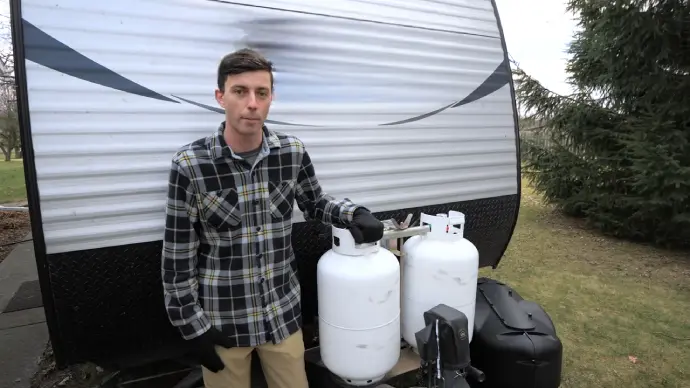Last Updated on May 18, 2023
If you’re new to RVing, it’s easy to get overwhelmed by all the types of RV equipment needed. But one component that may leave you scratching your head is the RV propane tank.
You may wonder if there are any differences between RV propane tanks and those used for grilling or heating homes. The short answer is yes, and there are differences.
Let’s talk about what makes RV propane tanks unique and what you should know before buying or hitting the road. So buckle up, and let’s explore the world of RV propane tanks.
Different Types of Portable RV Propane Tanks Based on Sizes
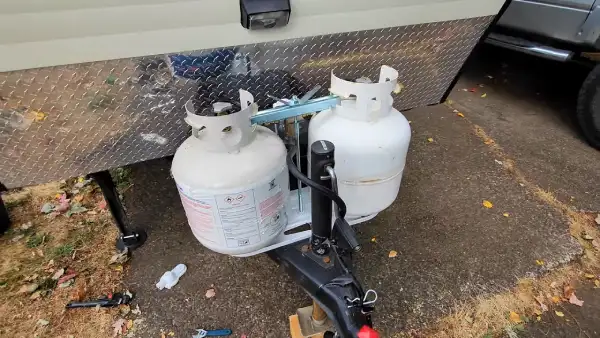
RV propane tanks come in various sizes and types, each with unique features and benefits.
Portable Propane Tanks
Portable RV propane tanks are popular for people who enjoy camping, tailgating, or any other outdoor activities requiring a reliable fuel source. These small and lightweight tanks make them easy to transport and store. They are also refillable, which means you can use them repeatedly.
Several portable propane tanks are available, but the most common type is the 20-pound tank, typically used for grilling and powering small appliances. This tank, also known as a barbecue cylinder, can be found at most hardware stores.
Stationary Propane Tanks
Stationary RV propane tanks are designed to be permanently installed in a specific location, such as a home or business. These tanks are typically larger than portable propane tanks and can hold more propane. The most common sizes for stationary propane tanks are 120 gallons, 250 gallons, 500 gallons, and 1000 gallons.
The larger size of stationary RV propane tanks allows them to provide a continuous supply to RVs that use propane for heating, cooking, and other purposes.
Different Types of Portable RV Propane Tanks Based on Weight
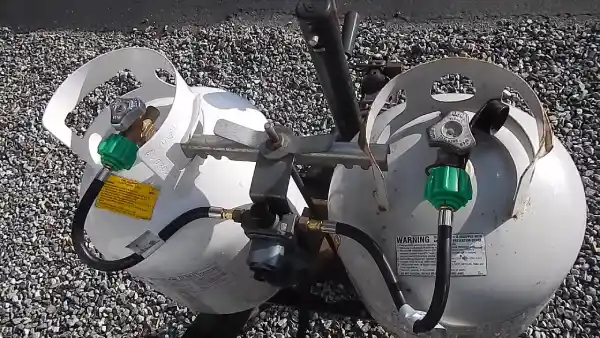
Portable RV propane tanks come in different weight to meet the needs of various recreational vehicles. It’s essential to choose the right size of propane tank for your RV to ensure that you have enough fuel to power all your appliances and devices.
20-Pound RV Propane Tanks
The most common size is the 20-pound RV propane tank. These tanks are commonly used for small to medium-sized RVs and can provide enough propane for appliances such as stoves, ovens, and water heaters.
A 20-pound portable RV propane tank is also known as the “barbecue tank” because it’s commonly used for outdoor grills. Finding these tanks at gas stations, hardware stores, or camping supply stores is relatively easy. They are portable and can be easily removed from the RV for refilling.
One thing to remember when using a 20-pound portable RV propane tank is that it may need to be refilled more frequently than larger tanks. This is because they have a smaller capacity and will run out of propane faster if multiple appliances are used simultaneously.
30-Pound RV Propane Tanks
RV 30-pound portable propane tanks are commonly used for RVs because they are not too large or heavy, making them easy to transport while holding enough propane to power appliances and systems.
One of the benefits of using a 30-pound RV propane tank is that it can last for a longer time than 20-pound tanks. For example, if you occasionally use your RV for weekend trips, a 30-pound tank may last several months.
40-Pound RV Propane Tanks
The portable 40-pound propane tank is also an RV intermediate bulk container (IBC). It has a capacity of approximately 4.4 gallons or 42 pounds of propane gas. This size is perfect for medium-sized RVs that require more propane than smaller tanks can provide but don’t need the larger capacity of a 100-pound tank.
One benefit of using a 40-pound tank is that it’s still portable and easily transported when needed. However, it’s important to note that these tanks are heavier than their smaller counterparts and may require more effort to move around.
100-Pound RV Propane Tanks
The 100-pound portable RV propane tank is larger than the standard 20-pound and 30-pound tanks commonly used in camping and outdoor activities. It has a load capacity of approximately 12 gallons, translating to about 80% usable propane or around 92,000 BTUs (British Thermal Units).
One advantage of using a 100-pound RV propane tank is its convenience. Since it has a larger capacity, you won’t have to refill it as often as smaller tanks. This makes it ideal for long-term camping or living in an RV full-time.
Also, some campgrounds and RV parks do not allow portable tanks, so having a stationary tank like the 100-pound option can be more convenient.
Different Types of Portable RV Propane Tanks Based on Construction Materials
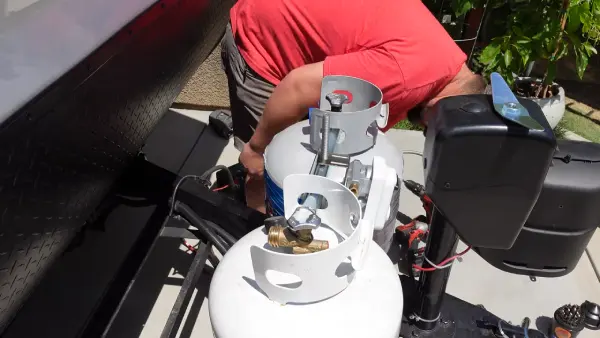
RV propane tanks are an essential component of any RV, and it is important to know the different materials they are made of. The two most common materials for RV propane tanks are steel and aluminum.
Steel RV Propane Tanks
Steel RV propane tanks are one of the most popular propane tanks used in recreational vehicles. These tanks are made from high-quality steel and are designed to withstand extreme temperatures and rough handling during transportation.
One of the main advantages of steel RV propane tanks is their durability. They can last many years with proper care and maintenance, making them a cost-effective choice for RV owners.
Steel tanks also have a higher resistance to impact damage than other materials, which makes them ideal for use in rugged outdoor environments.
Another benefit of steel RV portable propane tanks is their affordability. Steel is less expensive and readily available than other materials like aluminum. Replacing or upgrading your propane tank won’t break the bank.
Aluminum RV Propane Tanks
Aluminum RV Propane Tanks are becoming increasingly popular among recreational vehicle enthusiasts. These tanks are lightweight, durable, and corrosion-resistant, ideal for harsh environments.
One of the main advantages of aluminum RV propane tanks is their weight. They are significantly lighter than steel tanks, which makes them easier to handle and transport. This is particularly important for RV owners who frequently travel long distances and need to conserve fuel.
Another advantage of aluminum RV propane portable tanks is their durability. They are resistant to rust and corrosion, which means they can withstand exposure to harsh weather conditions without deteriorating.
In addition to being lightweight and durable, aluminum RV propane tanks have a longer lifespan than steel tanks. They can last up to 30 years with proper care and maintenance. RV owners who invest in these tanks can expect them to provide reliable service for many years.
Can I use any RV propane tank on a camper?
Not all RV propane tanks are meant to be used with campers. It is essential to choose a propane tank that is suitable for your specific camper.
The propane tank should be able to fit correctly in the designated space and comply with local regulations. It is advisable to consult your camper’s manufacturer or a certified RV technician to find out which propane tank is most compatible with your camper.
However, portable RV propane tanks are versatile and can be used with any camper. These tanks come in various sizes and can be easily transported and refilled.
What kind of propane tank do I need to use in an RV?
The propane tank used in an RV must comply with specific safety requirements to ensure the safety of the occupants and the vehicle. The two most common types of propane tanks used in RVs are ASME (American Society of Mechanical Engineers) tanks and DOT (Department of Transportation) cylinders.
ASME tanks are permanently mounted on the RV’s chassis, making them ideal for regular use. They have a higher capacity than DOT cylinders and are more durable and long-lasting. ASME tanks are available in sizes ranging from 20 to 100 pounds, making them suitable for different types of RVs.
Alternatively, DOT cylinders are portable and can be easily replaced when empty. They are available in various sizes, ranging from 1 to 40 pounds. DOT cylinders are ideal for occasional use, such as camping trips and weekend getaways.
Can I use a 20 lb RV propane tank on an RV?
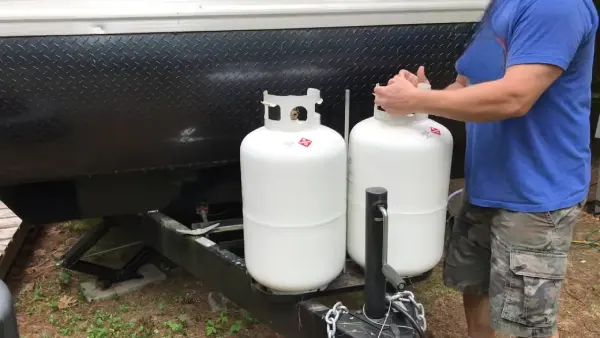
Using a 20-pound RV propane tank on an RV is possible, particularly on smaller motorhomes such as Class C motorhomes. This kind of tank is also called a grill propane tank and can fulfill the propane needs of small RVs.
It must be noted that the size of the propane tank will depend on the type of RV and its propane requirements. Hence, consulting an RV expert for advice on the appropriate propane tank size for specific RV models is essential.
Can I hook a regular portable propane tank to my RV?
A regular portable propane tank can be hooked to an RV’s propane system. However, an adapter is necessary to connect the external tank to the vehicle’s propane system. Depending on the RV model, you might need different adapters to connect a portable propane tank.
When choosing an adapter for the external propane tank, you should consult RV experts. Manufacturers also offer specific kits that fit their RV models, guaranteeing compatibility and safe installation. Follow all safety measures and guidelines to prevent risks and ensure efficient propane use.
Get Ready for a Stress-Free RV Adventure: Choose the Right Propane Tank
RV propane tanks are not all the same. Different types, sizes and materials can affect their performance and installation. Portable and stationary tanks offer various advantages depending on your needs.
Regarding size, 20-pound, 30-pound, 40-pound and 100-pound tanks are the most common options for RVs. But before choosing a tank size, you must consider its weight and storage capacity.
Whether you’re a seasoned RV owner or just starting, understanding the differences between propane tanks is crucial for safe travels and enjoyable camping experiences.
By choosing the right type of tank for your needs and installing it correctly, you can ensure that your propane system runs smoothly throughout your journey.
